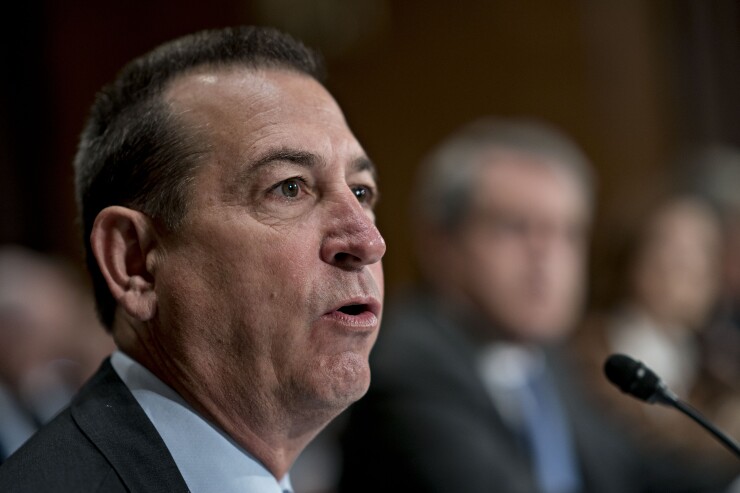WASHINGTON — Comptroller of the Currency Joseph Otting on Wednesday downplayed concerns that applicants for the agency's new fintech charter may face resistance from the Federal Reserve Board.
Some in the fintech industry are raising alarm that the Fed may balk at allowing holders of the new special-purpose charter into the payments system, which could reduce the overall value of the charter.
But Otting, speaking to a roundtable of reporters, said no firm considering applying to the OCC has mentioned the Fed as a potential roadblock. He argued that a fintech firm has other avenues for processing payments than joining the Fed system.

"I don’t view that as an impediment because most of these entities that today would apply to be a bank, many of them are operating today as a state-chartered or state-licensed lender and virtually all of them have a correspondent banking relationship with a large bank that gives them the ability to process checks and send wires,” he said. “I can tell you of the hundreds of meetings I’ve had with fintechs, not one has brought that issue up as an impediment.”
Otting also said federal regulators will soon take another step toward updating their anti-money-laundering requirements by releasing changes to the agencies' Bank Secrecy Act compliance manual.
He also signaled that a second regional bank may follow the agency's May guidance and make a formal leap into offering small-dollar installment loans, and reiterated his hope that the other agencies will join the OCC in a formal proposal to revamp the Community Reinvestment Act.
Despite downplaying concerns about the Fed's role in fintechs' pursuit of a federal charter, Otting said formal clarity is needed from the central bank on whether charter holders could offer payment services directly.
In the “long term, the Fed will have to make a decision whether they have the legal rights to offer that and that’s under discussion right now,” he said.
Another potential impediment is the ongoing litigation between the OCC and states, which argue the OCC is going beyond its jurisdiction in chartering fintechs. Otting has repeatedly argued the charter is within the OCC’s powers and coincides with the long-standing dual banking system in the U.S.
“I don’t understand why they want to limit consumers’ access to products because in my mind, I support the dual banking system,” he said. “We feel we have strong legal standing.”
The charter has been challenged in court by state regulators, but Otting said there may be clarity on the states' litigation this year.
“I think 2019 will be a pretty interesting time to watch fintechs, we will hopefully get the states ... issue resolved here and get a court decision on those as soon as possible,” he said.
On changes to the AML/BSA regime, Otting said he expects the agencies to unveil "rewrites" to examiners' AML manual in the first quarter.
For the past year, the banking agencies have worked with the Financial Crimes Enforcement Network to streamline AML and BSA regulations that bankers now say increases paperwork burden without a commensurate benefit in combating laundering.
The agencies have made roughly a dozen recommendations on reforming the AML framework that are gradually trickling out, such
The BSA manual is published by the Federal Financial Institutions Examination Council, which is made up of the OCC, Federal Reserve Board, the Federal Deposit Insurance Corp. and the National Credit Union Administration.
When asked if there are AML-related changes that the OCC can do on its own, Otting said he specifically wants to make changes to BSA reforms in conjunction with other regulators.
"We've tried to partner with Fincen to make sure that everybody is comfortable ... like the examination manual that we are expecting to get out in in the first quarter, I think is a huge undertaking but also a task that we're taking in conjunction with Fincen so that everybody agrees with the exam process going forward."
Meanwhile, Otting said he expects other banks to follow the lead of U.S. Bank in offering small-dollar products. In May, the OCC
“We expect another regional bank here shortly to make an announcement on them bringing their product back to the marketplace,” Otting said. “A lot of banks are now back in buying that product from ... vendors because they got the signal from the OCC that we were comfortable with them participating, using their balance sheet to support that respective activity.”
Otting also said he remained confident that the FDIC and Fed would join the OCC in a formal rulemaking to reform the Community Reinvestment Act, after the comptroller's agency went out on its own with an advance notice of proposed rulemaking last year to solicit feedback on how to enforce the law.
“A lot of other people make out like OCC was the ‘lone wolf’ . . . but the bottom line is we spent an enormous amount of time meeting with the FDIC and Fed on the” ANPR, Otting said. “I’m highly confident that we’ll figure out a joint solution amongst the three agencies.”
Otting added that OCC staff have shared the comments from the ANPR with the FDIC and Fed just last week. When asked whether the OCC would proceed without the other regulators in issuing a formal proposed rulemaking, Otting said, “I don’t think that that’s going to be necessary . . . I’m highly confident that we’re going to get to a happy medium, so to speak, for all of us to be able to support."




